Effective Study Skills for Success in Higher Education Report
VerifiedAdded on 2023/01/18
|8
|1425
|32
Report
AI Summary
This report provides a comprehensive overview of study skills essential for success in higher education. It begins with an introduction to learning styles, discussing visual, aural, verbal, physical, logical, social, and solitary styles, along with their benefits and strategies for improving memory retention. The main body then delves into developing a study plan, differentiating between short-term and long-term academic and professional goals, and providing a structured weekly study schedule. The report emphasizes the importance of time management, effective learning techniques, and the practical application of these skills to achieve academic and career aspirations. It concludes by reiterating the value of these strategies and the importance of consistent implementation for achieving the set targets. References to relevant academic sources are included.
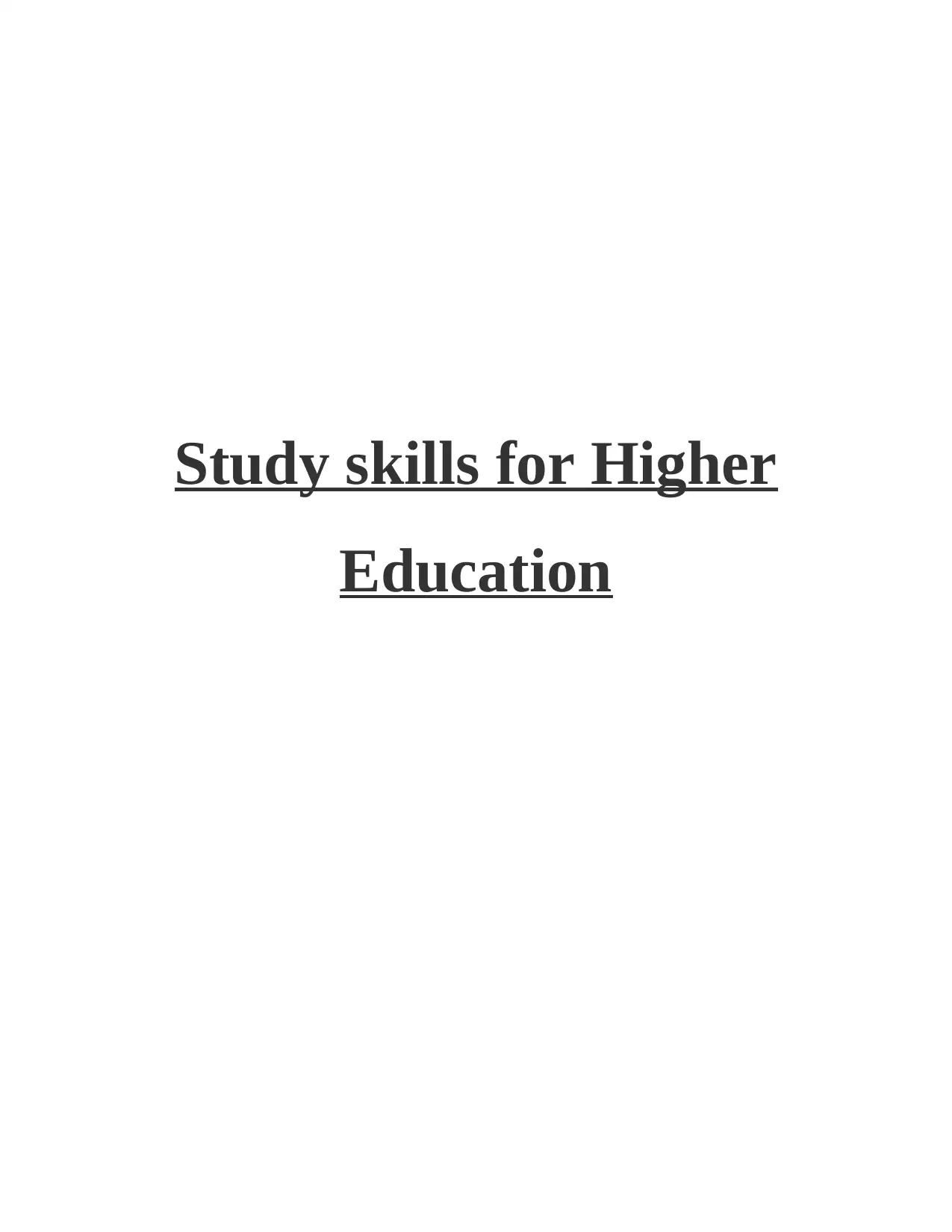
Study skills for Higher
Education
Education
Paraphrase This Document
Need a fresh take? Get an instant paraphrase of this document with our AI Paraphraser
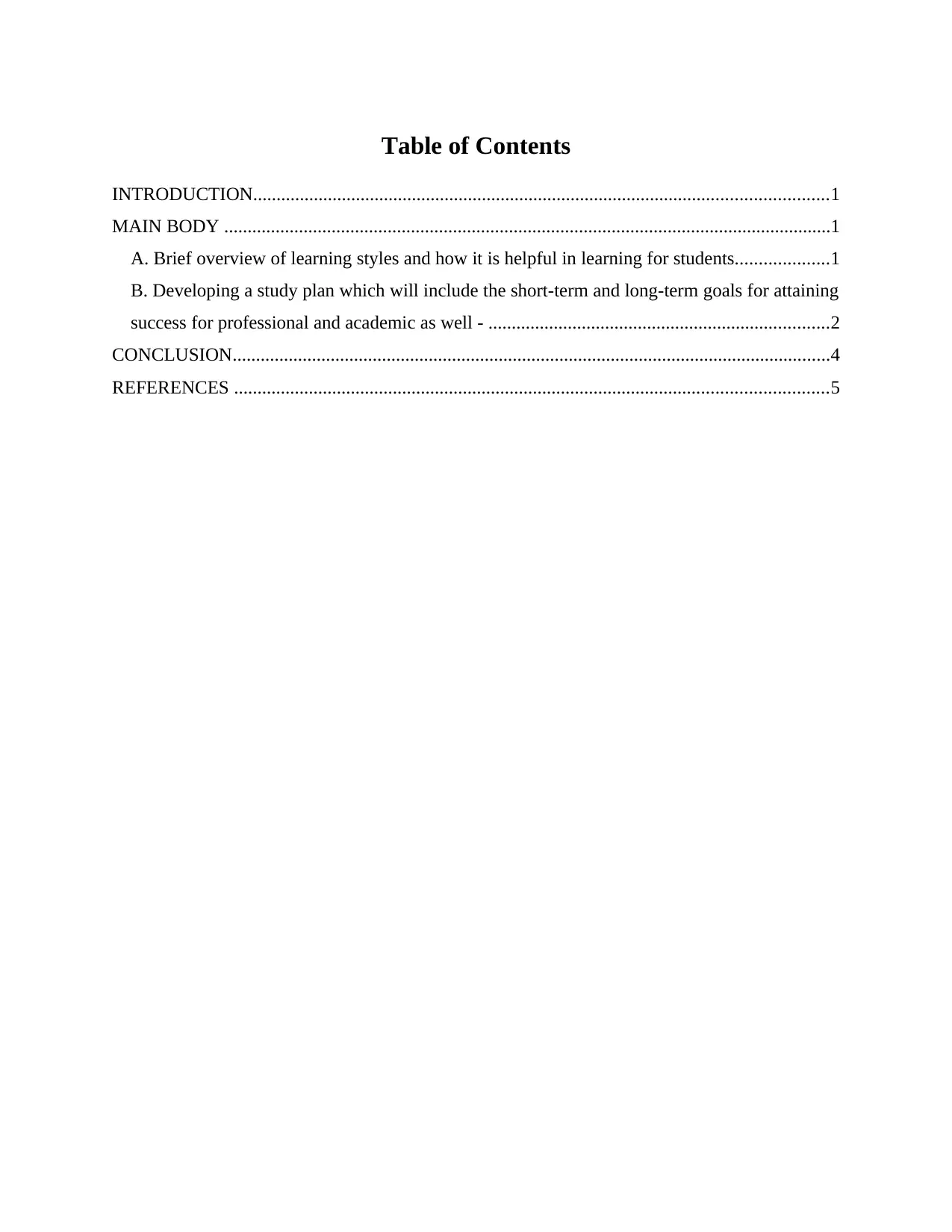
Table of Contents
INTRODUCTION...........................................................................................................................1
MAIN BODY ..................................................................................................................................1
A. Brief overview of learning styles and how it is helpful in learning for students....................1
B. Developing a study plan which will include the short-term and long-term goals for attaining
success for professional and academic as well - .........................................................................2
CONCLUSION................................................................................................................................4
REFERENCES ...............................................................................................................................5
INTRODUCTION...........................................................................................................................1
MAIN BODY ..................................................................................................................................1
A. Brief overview of learning styles and how it is helpful in learning for students....................1
B. Developing a study plan which will include the short-term and long-term goals for attaining
success for professional and academic as well - .........................................................................2
CONCLUSION................................................................................................................................4
REFERENCES ...............................................................................................................................5
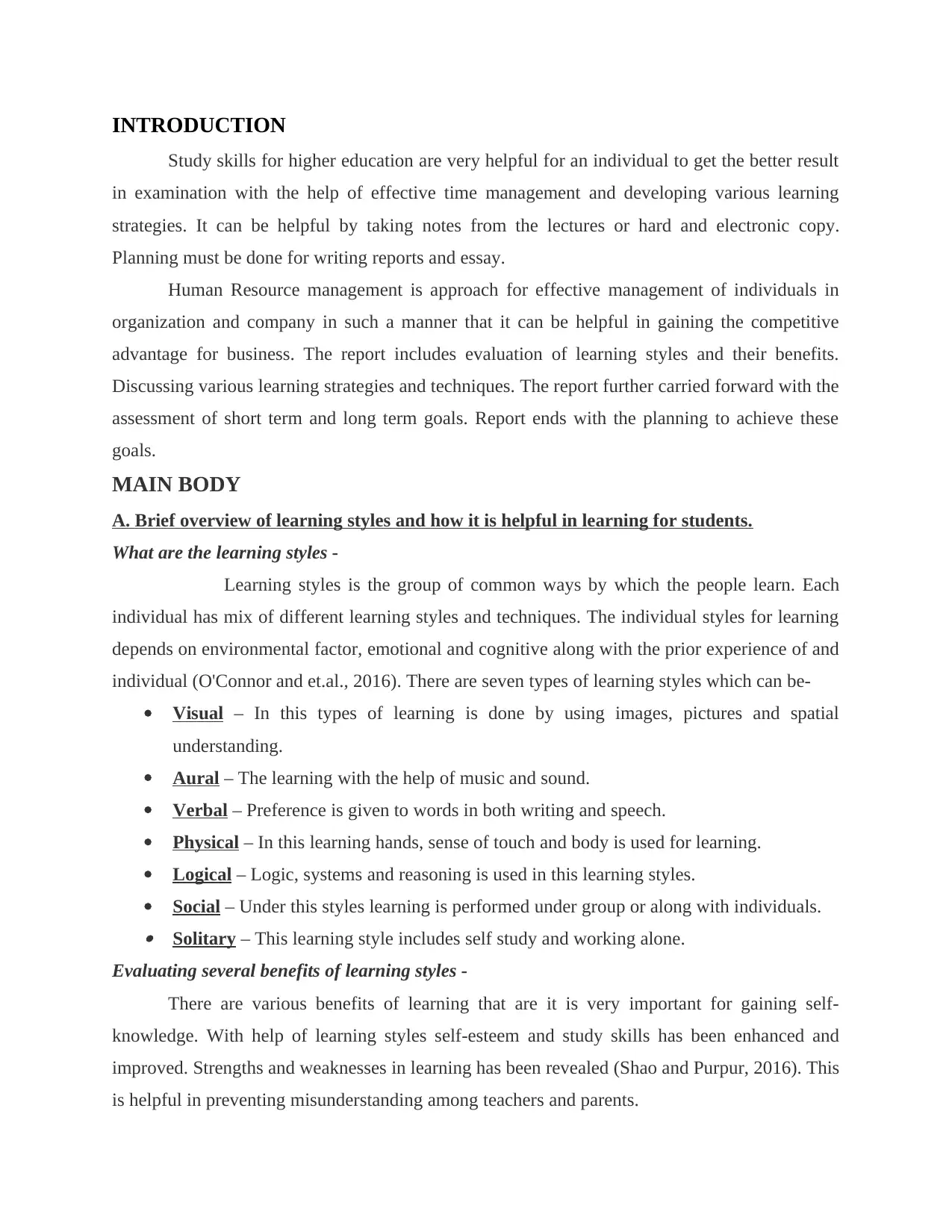
INTRODUCTION
Study skills for higher education are very helpful for an individual to get the better result
in examination with the help of effective time management and developing various learning
strategies. It can be helpful by taking notes from the lectures or hard and electronic copy.
Planning must be done for writing reports and essay.
Human Resource management is approach for effective management of individuals in
organization and company in such a manner that it can be helpful in gaining the competitive
advantage for business. The report includes evaluation of learning styles and their benefits.
Discussing various learning strategies and techniques. The report further carried forward with the
assessment of short term and long term goals. Report ends with the planning to achieve these
goals.
MAIN BODY
A. Brief overview of learning styles and how it is helpful in learning for students.
What are the learning styles -
Learning styles is the group of common ways by which the people learn. Each
individual has mix of different learning styles and techniques. The individual styles for learning
depends on environmental factor, emotional and cognitive along with the prior experience of and
individual (O'Connor and et.al., 2016). There are seven types of learning styles which can be-
Visual – In this types of learning is done by using images, pictures and spatial
understanding.
Aural – The learning with the help of music and sound.
Verbal – Preference is given to words in both writing and speech.
Physical – In this learning hands, sense of touch and body is used for learning.
Logical – Logic, systems and reasoning is used in this learning styles.
Social – Under this styles learning is performed under group or along with individuals. Solitary – This learning style includes self study and working alone.
Evaluating several benefits of learning styles -
There are various benefits of learning that are it is very important for gaining self-
knowledge. With help of learning styles self-esteem and study skills has been enhanced and
improved. Strengths and weaknesses in learning has been revealed (Shao and Purpur, 2016). This
is helpful in preventing misunderstanding among teachers and parents.
Study skills for higher education are very helpful for an individual to get the better result
in examination with the help of effective time management and developing various learning
strategies. It can be helpful by taking notes from the lectures or hard and electronic copy.
Planning must be done for writing reports and essay.
Human Resource management is approach for effective management of individuals in
organization and company in such a manner that it can be helpful in gaining the competitive
advantage for business. The report includes evaluation of learning styles and their benefits.
Discussing various learning strategies and techniques. The report further carried forward with the
assessment of short term and long term goals. Report ends with the planning to achieve these
goals.
MAIN BODY
A. Brief overview of learning styles and how it is helpful in learning for students.
What are the learning styles -
Learning styles is the group of common ways by which the people learn. Each
individual has mix of different learning styles and techniques. The individual styles for learning
depends on environmental factor, emotional and cognitive along with the prior experience of and
individual (O'Connor and et.al., 2016). There are seven types of learning styles which can be-
Visual – In this types of learning is done by using images, pictures and spatial
understanding.
Aural – The learning with the help of music and sound.
Verbal – Preference is given to words in both writing and speech.
Physical – In this learning hands, sense of touch and body is used for learning.
Logical – Logic, systems and reasoning is used in this learning styles.
Social – Under this styles learning is performed under group or along with individuals. Solitary – This learning style includes self study and working alone.
Evaluating several benefits of learning styles -
There are various benefits of learning that are it is very important for gaining self-
knowledge. With help of learning styles self-esteem and study skills has been enhanced and
improved. Strengths and weaknesses in learning has been revealed (Shao and Purpur, 2016). This
is helpful in preventing misunderstanding among teachers and parents.
⊘ This is a preview!⊘
Do you want full access?
Subscribe today to unlock all pages.

Trusted by 1+ million students worldwide
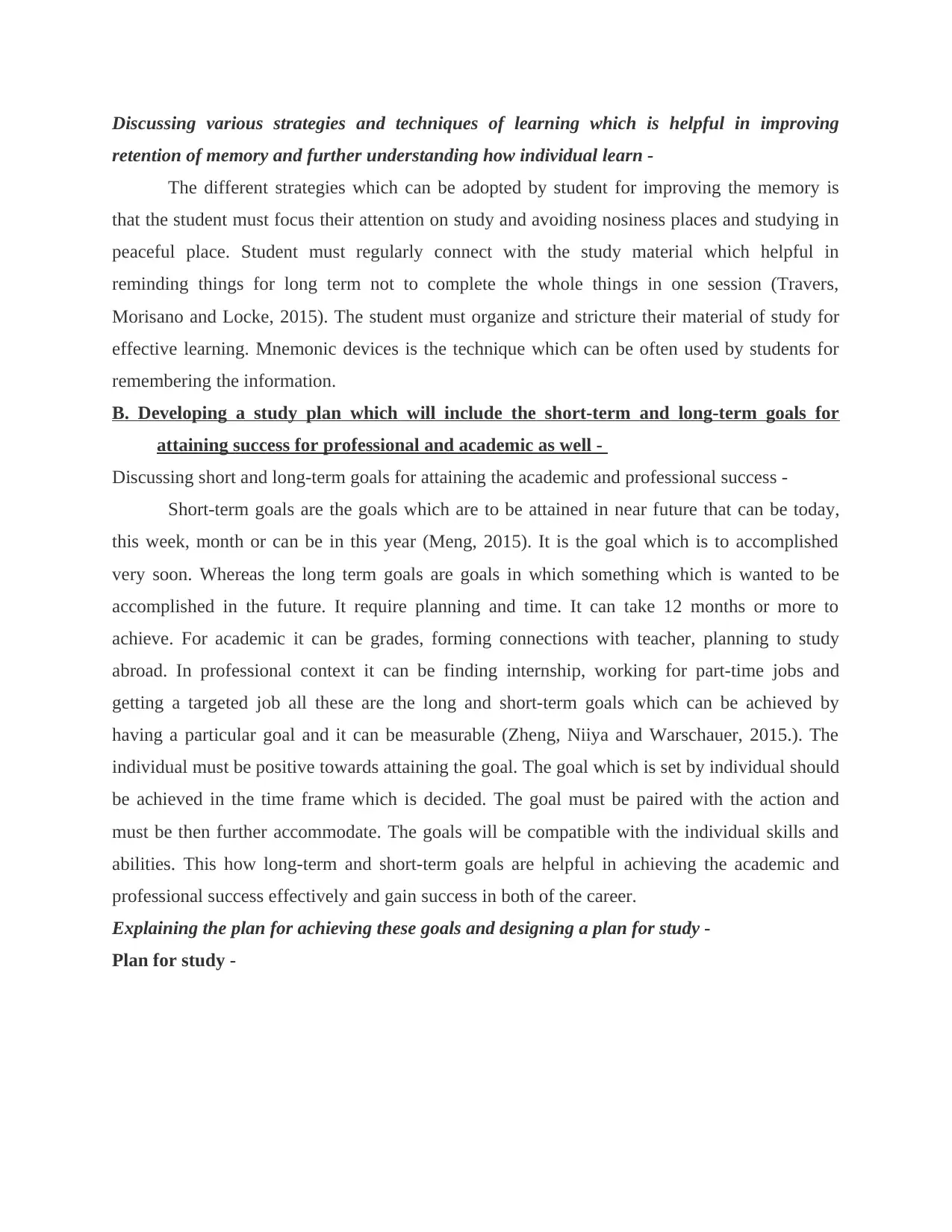
Discussing various strategies and techniques of learning which is helpful in improving
retention of memory and further understanding how individual learn -
The different strategies which can be adopted by student for improving the memory is
that the student must focus their attention on study and avoiding nosiness places and studying in
peaceful place. Student must regularly connect with the study material which helpful in
reminding things for long term not to complete the whole things in one session (Travers,
Morisano and Locke, 2015). The student must organize and stricture their material of study for
effective learning. Mnemonic devices is the technique which can be often used by students for
remembering the information.
B. Developing a study plan which will include the short-term and long-term goals for
attaining success for professional and academic as well -
Discussing short and long-term goals for attaining the academic and professional success -
Short-term goals are the goals which are to be attained in near future that can be today,
this week, month or can be in this year (Meng, 2015). It is the goal which is to accomplished
very soon. Whereas the long term goals are goals in which something which is wanted to be
accomplished in the future. It require planning and time. It can take 12 months or more to
achieve. For academic it can be grades, forming connections with teacher, planning to study
abroad. In professional context it can be finding internship, working for part-time jobs and
getting a targeted job all these are the long and short-term goals which can be achieved by
having a particular goal and it can be measurable (Zheng, Niiya and Warschauer, 2015.). The
individual must be positive towards attaining the goal. The goal which is set by individual should
be achieved in the time frame which is decided. The goal must be paired with the action and
must be then further accommodate. The goals will be compatible with the individual skills and
abilities. This how long-term and short-term goals are helpful in achieving the academic and
professional success effectively and gain success in both of the career.
Explaining the plan for achieving these goals and designing a plan for study -
Plan for study -
retention of memory and further understanding how individual learn -
The different strategies which can be adopted by student for improving the memory is
that the student must focus their attention on study and avoiding nosiness places and studying in
peaceful place. Student must regularly connect with the study material which helpful in
reminding things for long term not to complete the whole things in one session (Travers,
Morisano and Locke, 2015). The student must organize and stricture their material of study for
effective learning. Mnemonic devices is the technique which can be often used by students for
remembering the information.
B. Developing a study plan which will include the short-term and long-term goals for
attaining success for professional and academic as well -
Discussing short and long-term goals for attaining the academic and professional success -
Short-term goals are the goals which are to be attained in near future that can be today,
this week, month or can be in this year (Meng, 2015). It is the goal which is to accomplished
very soon. Whereas the long term goals are goals in which something which is wanted to be
accomplished in the future. It require planning and time. It can take 12 months or more to
achieve. For academic it can be grades, forming connections with teacher, planning to study
abroad. In professional context it can be finding internship, working for part-time jobs and
getting a targeted job all these are the long and short-term goals which can be achieved by
having a particular goal and it can be measurable (Zheng, Niiya and Warschauer, 2015.). The
individual must be positive towards attaining the goal. The goal which is set by individual should
be achieved in the time frame which is decided. The goal must be paired with the action and
must be then further accommodate. The goals will be compatible with the individual skills and
abilities. This how long-term and short-term goals are helpful in achieving the academic and
professional success effectively and gain success in both of the career.
Explaining the plan for achieving these goals and designing a plan for study -
Plan for study -
Paraphrase This Document
Need a fresh take? Get an instant paraphrase of this document with our AI Paraphraser
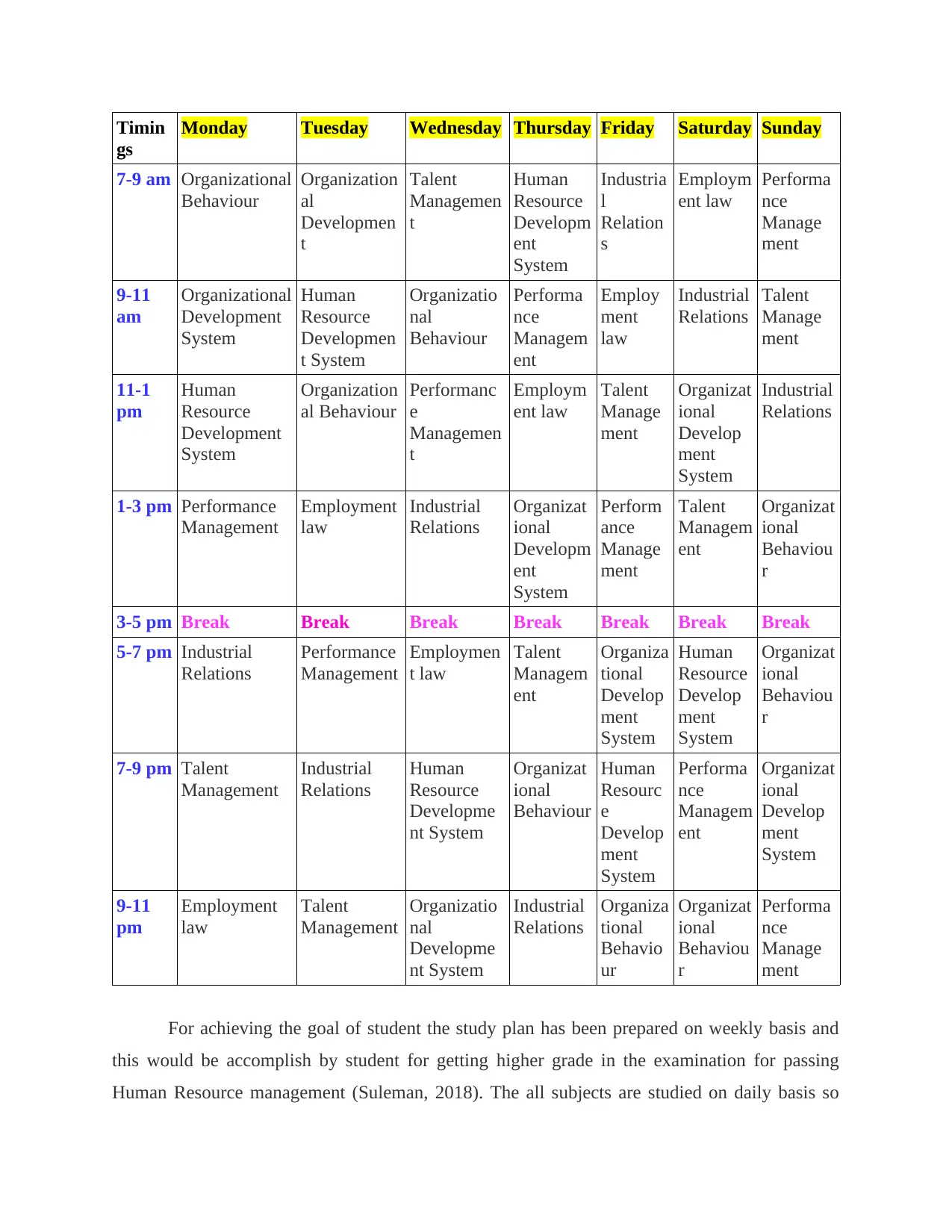
Timin
gs
Monday Tuesday Wednesday Thursday Friday Saturday Sunday
7-9 am Organizational
Behaviour
Organization
al
Developmen
t
Talent
Managemen
t
Human
Resource
Developm
ent
System
Industria
l
Relation
s
Employm
ent law
Performa
nce
Manage
ment
9-11
am
Organizational
Development
System
Human
Resource
Developmen
t System
Organizatio
nal
Behaviour
Performa
nce
Managem
ent
Employ
ment
law
Industrial
Relations
Talent
Manage
ment
11-1
pm
Human
Resource
Development
System
Organization
al Behaviour
Performanc
e
Managemen
t
Employm
ent law
Talent
Manage
ment
Organizat
ional
Develop
ment
System
Industrial
Relations
1-3 pm Performance
Management
Employment
law
Industrial
Relations
Organizat
ional
Developm
ent
System
Perform
ance
Manage
ment
Talent
Managem
ent
Organizat
ional
Behaviou
r
3-5 pm Break Break Break Break Break Break Break
5-7 pm Industrial
Relations
Performance
Management
Employmen
t law
Talent
Managem
ent
Organiza
tional
Develop
ment
System
Human
Resource
Develop
ment
System
Organizat
ional
Behaviou
r
7-9 pm Talent
Management
Industrial
Relations
Human
Resource
Developme
nt System
Organizat
ional
Behaviour
Human
Resourc
e
Develop
ment
System
Performa
nce
Managem
ent
Organizat
ional
Develop
ment
System
9-11
pm
Employment
law
Talent
Management
Organizatio
nal
Developme
nt System
Industrial
Relations
Organiza
tional
Behavio
ur
Organizat
ional
Behaviou
r
Performa
nce
Manage
ment
For achieving the goal of student the study plan has been prepared on weekly basis and
this would be accomplish by student for getting higher grade in the examination for passing
Human Resource management (Suleman, 2018). The all subjects are studied on daily basis so
gs
Monday Tuesday Wednesday Thursday Friday Saturday Sunday
7-9 am Organizational
Behaviour
Organization
al
Developmen
t
Talent
Managemen
t
Human
Resource
Developm
ent
System
Industria
l
Relation
s
Employm
ent law
Performa
nce
Manage
ment
9-11
am
Organizational
Development
System
Human
Resource
Developmen
t System
Organizatio
nal
Behaviour
Performa
nce
Managem
ent
Employ
ment
law
Industrial
Relations
Talent
Manage
ment
11-1
pm
Human
Resource
Development
System
Organization
al Behaviour
Performanc
e
Managemen
t
Employm
ent law
Talent
Manage
ment
Organizat
ional
Develop
ment
System
Industrial
Relations
1-3 pm Performance
Management
Employment
law
Industrial
Relations
Organizat
ional
Developm
ent
System
Perform
ance
Manage
ment
Talent
Managem
ent
Organizat
ional
Behaviou
r
3-5 pm Break Break Break Break Break Break Break
5-7 pm Industrial
Relations
Performance
Management
Employmen
t law
Talent
Managem
ent
Organiza
tional
Develop
ment
System
Human
Resource
Develop
ment
System
Organizat
ional
Behaviou
r
7-9 pm Talent
Management
Industrial
Relations
Human
Resource
Developme
nt System
Organizat
ional
Behaviour
Human
Resourc
e
Develop
ment
System
Performa
nce
Managem
ent
Organizat
ional
Develop
ment
System
9-11
pm
Employment
law
Talent
Management
Organizatio
nal
Developme
nt System
Industrial
Relations
Organiza
tional
Behavio
ur
Organizat
ional
Behaviou
r
Performa
nce
Manage
ment
For achieving the goal of student the study plan has been prepared on weekly basis and
this would be accomplish by student for getting higher grade in the examination for passing
Human Resource management (Suleman, 2018). The all subjects are studied on daily basis so
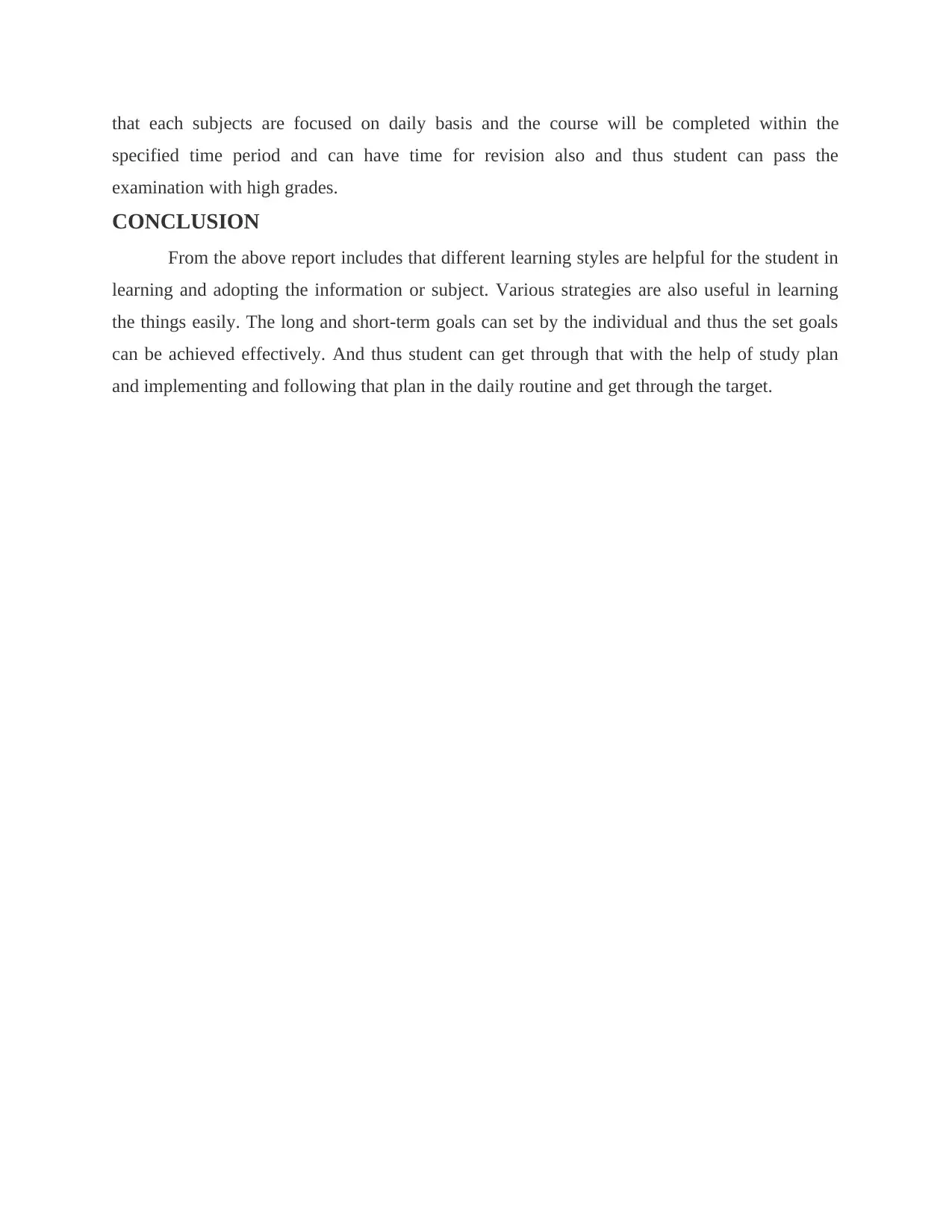
that each subjects are focused on daily basis and the course will be completed within the
specified time period and can have time for revision also and thus student can pass the
examination with high grades.
CONCLUSION
From the above report includes that different learning styles are helpful for the student in
learning and adopting the information or subject. Various strategies are also useful in learning
the things easily. The long and short-term goals can set by the individual and thus the set goals
can be achieved effectively. And thus student can get through that with the help of study plan
and implementing and following that plan in the daily routine and get through the target.
specified time period and can have time for revision also and thus student can pass the
examination with high grades.
CONCLUSION
From the above report includes that different learning styles are helpful for the student in
learning and adopting the information or subject. Various strategies are also useful in learning
the things easily. The long and short-term goals can set by the individual and thus the set goals
can be achieved effectively. And thus student can get through that with the help of study plan
and implementing and following that plan in the daily routine and get through the target.
⊘ This is a preview!⊘
Do you want full access?
Subscribe today to unlock all pages.

Trusted by 1+ million students worldwide
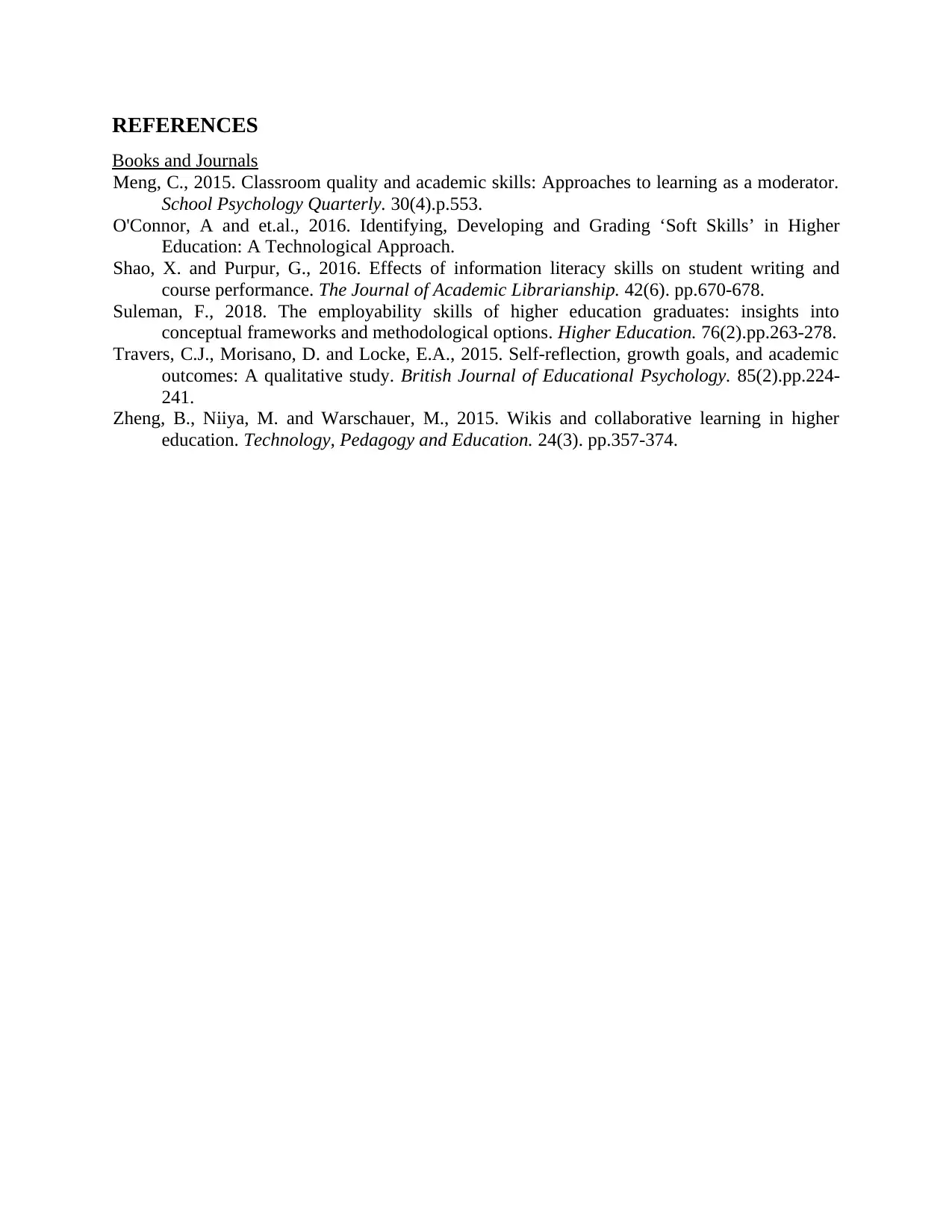
REFERENCES
Books and Journals
Meng, C., 2015. Classroom quality and academic skills: Approaches to learning as a moderator.
School Psychology Quarterly. 30(4).p.553.
O'Connor, A and et.al., 2016. Identifying, Developing and Grading ‘Soft Skills’ in Higher
Education: A Technological Approach.
Shao, X. and Purpur, G., 2016. Effects of information literacy skills on student writing and
course performance. The Journal of Academic Librarianship. 42(6). pp.670-678.
Suleman, F., 2018. The employability skills of higher education graduates: insights into
conceptual frameworks and methodological options. Higher Education. 76(2).pp.263-278.
Travers, C.J., Morisano, D. and Locke, E.A., 2015. Self‐reflection, growth goals, and academic
outcomes: A qualitative study. British Journal of Educational Psychology. 85(2).pp.224-
241.
Zheng, B., Niiya, M. and Warschauer, M., 2015. Wikis and collaborative learning in higher
education. Technology, Pedagogy and Education. 24(3). pp.357-374.
Books and Journals
Meng, C., 2015. Classroom quality and academic skills: Approaches to learning as a moderator.
School Psychology Quarterly. 30(4).p.553.
O'Connor, A and et.al., 2016. Identifying, Developing and Grading ‘Soft Skills’ in Higher
Education: A Technological Approach.
Shao, X. and Purpur, G., 2016. Effects of information literacy skills on student writing and
course performance. The Journal of Academic Librarianship. 42(6). pp.670-678.
Suleman, F., 2018. The employability skills of higher education graduates: insights into
conceptual frameworks and methodological options. Higher Education. 76(2).pp.263-278.
Travers, C.J., Morisano, D. and Locke, E.A., 2015. Self‐reflection, growth goals, and academic
outcomes: A qualitative study. British Journal of Educational Psychology. 85(2).pp.224-
241.
Zheng, B., Niiya, M. and Warschauer, M., 2015. Wikis and collaborative learning in higher
education. Technology, Pedagogy and Education. 24(3). pp.357-374.
Paraphrase This Document
Need a fresh take? Get an instant paraphrase of this document with our AI Paraphraser

1 out of 8
Related Documents
Your All-in-One AI-Powered Toolkit for Academic Success.
+13062052269
info@desklib.com
Available 24*7 on WhatsApp / Email
![[object Object]](/_next/static/media/star-bottom.7253800d.svg)
Unlock your academic potential
Copyright © 2020–2026 A2Z Services. All Rights Reserved. Developed and managed by ZUCOL.





